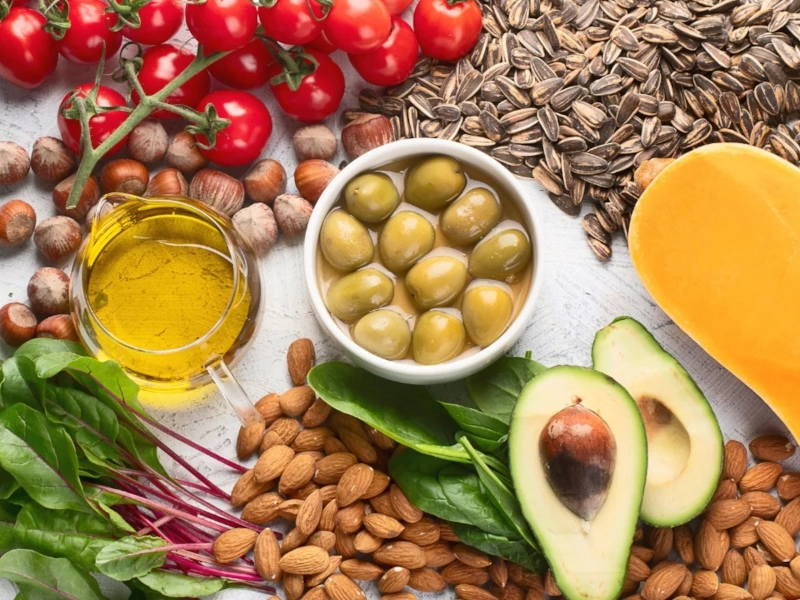Vitamin E, a group of fat-soluble compounds known as tocotrienols, is essential for various bodily functions. Adequate intake of this nutrient is crucial for preventing heart disease, protecting against cancer, and enhancing the immune system. The National Institutes of Health (NIH) recommends that adults aged 14 and over consume 15 mg of vitamin E daily, while nursing mothers should aim for 19 mg. A well-balanced diet, particularly one rich in tocotrienols, can help you meet these requirements.

 Vitamin E acts as an antioxidant by scavenging free radicals that can cause cellular damage and contribute to disease. It is particularly beneficial for heart health as it helps prevent the oxidation of cholesterol and lipids in blood vessels, reducing the risk of atherosclerosis, which can lead to heart attacks or strokes.
Additionally, vitamin E may lower both systolic and diastolic blood pressure, which is associated with cardiovascular disease risk. It can also enhance the absorption of fat-soluble vitamins, such as D and K, in individuals with fat malabsorption disorders.
Dietary sources of vitamin E include meats, nuts, seeds, leafy vegetables, and vegetable oils. Supplements are widely available, and while most are esterified for shelf stability, they can still be effectively absorbed by the body.
Vitamin E acts as an antioxidant by scavenging free radicals that can cause cellular damage and contribute to disease. It is particularly beneficial for heart health as it helps prevent the oxidation of cholesterol and lipids in blood vessels, reducing the risk of atherosclerosis, which can lead to heart attacks or strokes.
Additionally, vitamin E may lower both systolic and diastolic blood pressure, which is associated with cardiovascular disease risk. It can also enhance the absorption of fat-soluble vitamins, such as D and K, in individuals with fat malabsorption disorders.
Dietary sources of vitamin E include meats, nuts, seeds, leafy vegetables, and vegetable oils. Supplements are widely available, and while most are esterified for shelf stability, they can still be effectively absorbed by the body.
 Vitamin E consists of eight fat-soluble antioxidants (alpha-, beta-, gamma-, and delta-tocopherol and tocotrienols) that work together to combat free radicals—unstable molecules that can damage healthy cells. By eliminating these toxins, vitamin E helps protect against cell damage, reduces oxidative stress, supports immune function, and promotes healthy vision and skin.
Natural sources of vitamin E include vegetable oils, nuts, and seeds. For instance, one ounce of sunflower seeds or almonds provides 49% of the daily requirement for this essential vitamin. While many multivitamins contain vitamin E, caution is advised when taking synthetic forms, as they may not possess the same antioxidant properties as natural tocopherols and tocotrienols. Synthetic vitamin E can also interfere with the cholesterol-lowering effects of certain omega-3 fatty acids and diminish the effectiveness of blood-thinning medications.
Vitamin E consists of eight fat-soluble antioxidants (alpha-, beta-, gamma-, and delta-tocopherol and tocotrienols) that work together to combat free radicals—unstable molecules that can damage healthy cells. By eliminating these toxins, vitamin E helps protect against cell damage, reduces oxidative stress, supports immune function, and promotes healthy vision and skin.
Natural sources of vitamin E include vegetable oils, nuts, and seeds. For instance, one ounce of sunflower seeds or almonds provides 49% of the daily requirement for this essential vitamin. While many multivitamins contain vitamin E, caution is advised when taking synthetic forms, as they may not possess the same antioxidant properties as natural tocopherols and tocotrienols. Synthetic vitamin E can also interfere with the cholesterol-lowering effects of certain omega-3 fatty acids and diminish the effectiveness of blood-thinning medications.
 Antioxidant nutrients like vitamin E protect cellular components from damage caused by free radicals, which can lead to cancer and other health issues. However, human studies linking vitamin E intake or supplements to cancer risk have produced mixed results. Two large clinical trials—the HOPE-TOO Trial and the Women's Health Study—found that taking 400 IU of vitamin E (d-alpha tocopherol) daily reduced cardiovascular disease events but did not significantly impact cancer incidence or mortality rates.
To ensure adequate vitamin E intake and help prevent oxidative stress and related health issues, consume foods rich in this fat-soluble vitamin, including leafy vegetables, fruits, lean meats, poultry, fish, tofu, nuts, seeds, and whole grains. The Recommended Dietary Allowance (RDA) for adults is 15 mg per day, with slightly higher needs for pregnant and lactating women. Vitamin E supports healthy immune function and cellular signaling and may protect against conditions like heart disease and mild cognitive impairment.
Antioxidant nutrients like vitamin E protect cellular components from damage caused by free radicals, which can lead to cancer and other health issues. However, human studies linking vitamin E intake or supplements to cancer risk have produced mixed results. Two large clinical trials—the HOPE-TOO Trial and the Women's Health Study—found that taking 400 IU of vitamin E (d-alpha tocopherol) daily reduced cardiovascular disease events but did not significantly impact cancer incidence or mortality rates.
To ensure adequate vitamin E intake and help prevent oxidative stress and related health issues, consume foods rich in this fat-soluble vitamin, including leafy vegetables, fruits, lean meats, poultry, fish, tofu, nuts, seeds, and whole grains. The Recommended Dietary Allowance (RDA) for adults is 15 mg per day, with slightly higher needs for pregnant and lactating women. Vitamin E supports healthy immune function and cellular signaling and may protect against conditions like heart disease and mild cognitive impairment.